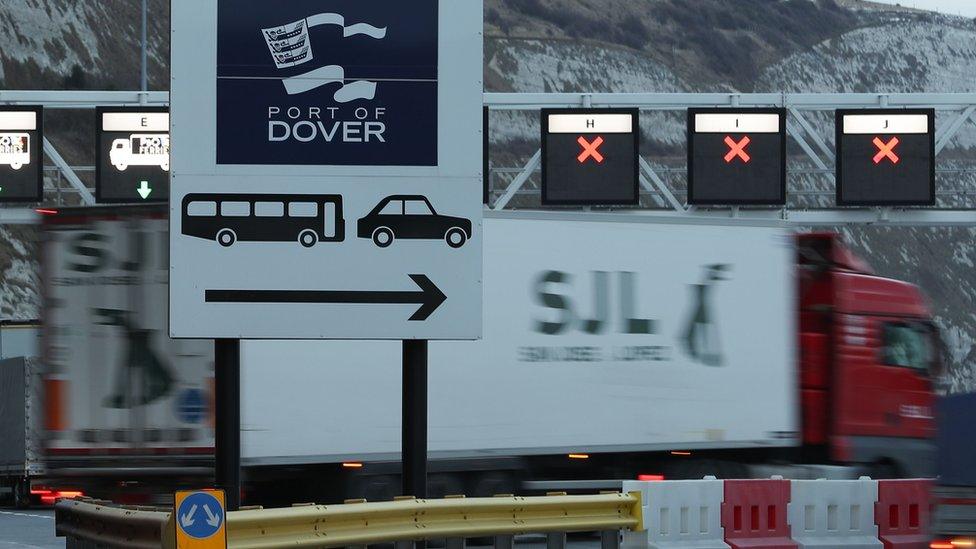No-deal Brexit: Who will the new PM believe?
- Published

The OBR's numbers assume minimal disruption at Dover after Brexit
It is not possible to make a concrete forecast of a situation that is unprecedented.
But this report, external takes the extreme pessimism of other economists and the extreme optimism of some politicians and pretty much splits the difference - and even then, it is not a pretty sight.
It is the first time that the government's independent experts on tax and spend - the Office for Budget Responsibility - have assessed what happens to the Treasury tax billions and to public spending if the UK leaves the EU without a deal.
This is a serious, detailed look at the impact of a no-deal Brexit. It does include positive surprises: for example, next year under no deal, the UK will tax some imports through tariffs and also pay less interest on debts. That's £11bn more in the coffers at the Treasury next year.
But that is hugely outweighed by a projected hit to taxes on workers, businesses and housing and extra spending on welfare worth £41bn.
So from next year, the hit to public finances - basically, the increase in borrowing - is £30bn annually and rising. Another way of putting that is over half a billion, £567m a week in the red.
The famous red referendum bus suggested something rather different - extra billions for public services, not extra borrowing. But the OBR's stress test of leaving the EU without a deal and without a transition period points to a significantly higher national debt.
Doom and gloom?
All of these numbers hinge on a story/scenario about the economy that the government's independent budgetary watchdog has borrowed from the IMF: there is a hit to the economy, a recession and then a slow recovery.
Within that, by next year the pound loses 10% of its value versus the euro, while prices again rise faster than wages - a national pay cut in real terms again, just as that trend seemed to have reversed.
House prices are seen next year as 8% less than forecast in March. And crucially, all this uncertainty sees a 10% hit to business investment, the driver of growth and productivity.
So is this all doom and gloom? Well, actually it could be worse. The chancellor is stressing this was the IMF's benign scenario of a no-deal Brexit.
The OBR's numbers are built on an assumption that there will only be minimal disruption from new customs procedures at Dover, and that is far from certain.
This report from the government's official independent advisers on tax, spend and borrowing raises a challenge to those waiting in the wings to take control at Number 10 and Number 11.
Dilemma for government
One Boris Johnson supporter described the report as "rubbish in, rubbish out". The numbers doesn't include the positive impact of new future free-trade deals, or a mooted plan to borrow even more to fund a no-deal economic rescue plan. The consensus on the former is that the likely boost to the economy is modest.
More pertinently, perhaps, this assessment comes at a time when the economy is already slowing, at least partly because of business's preparations for no deal, with production pauses and supply chains starting to break.
But it is quite the dilemma, though, for a new administration due in the coming days.
Do they believe in independent advice, indeed in their own experts, or not?
It is something that will be tested, not just here in fiscal policy, but in their decisions over a new trading policy, and potentially in the choice of a new Bank of England governor too.
